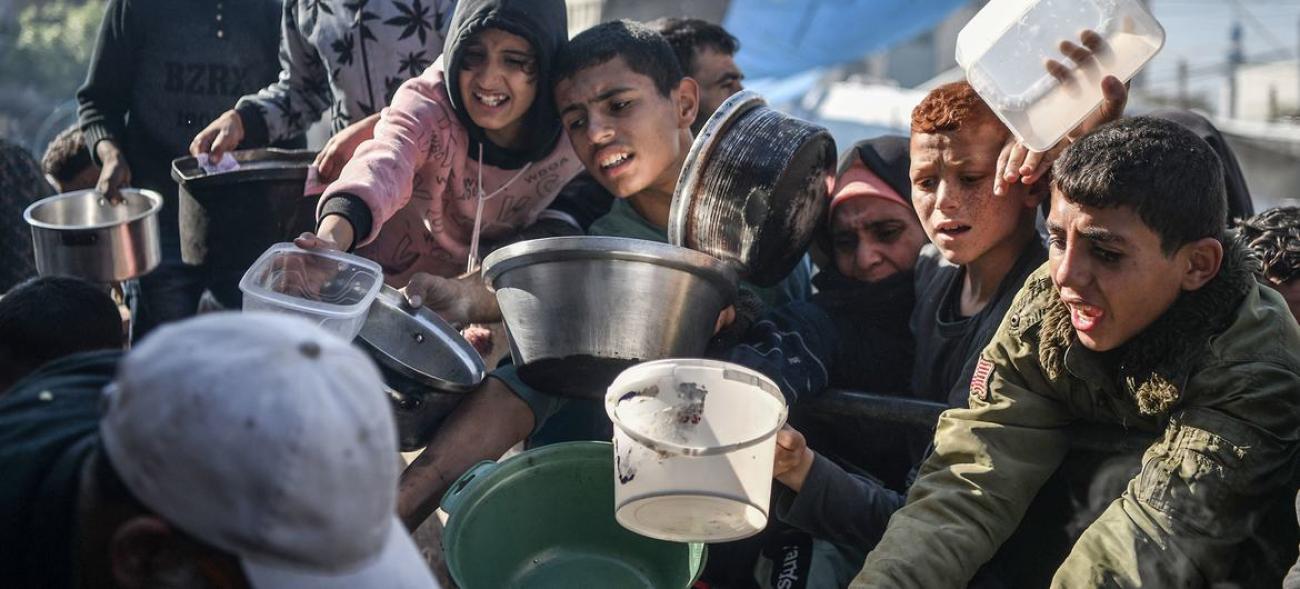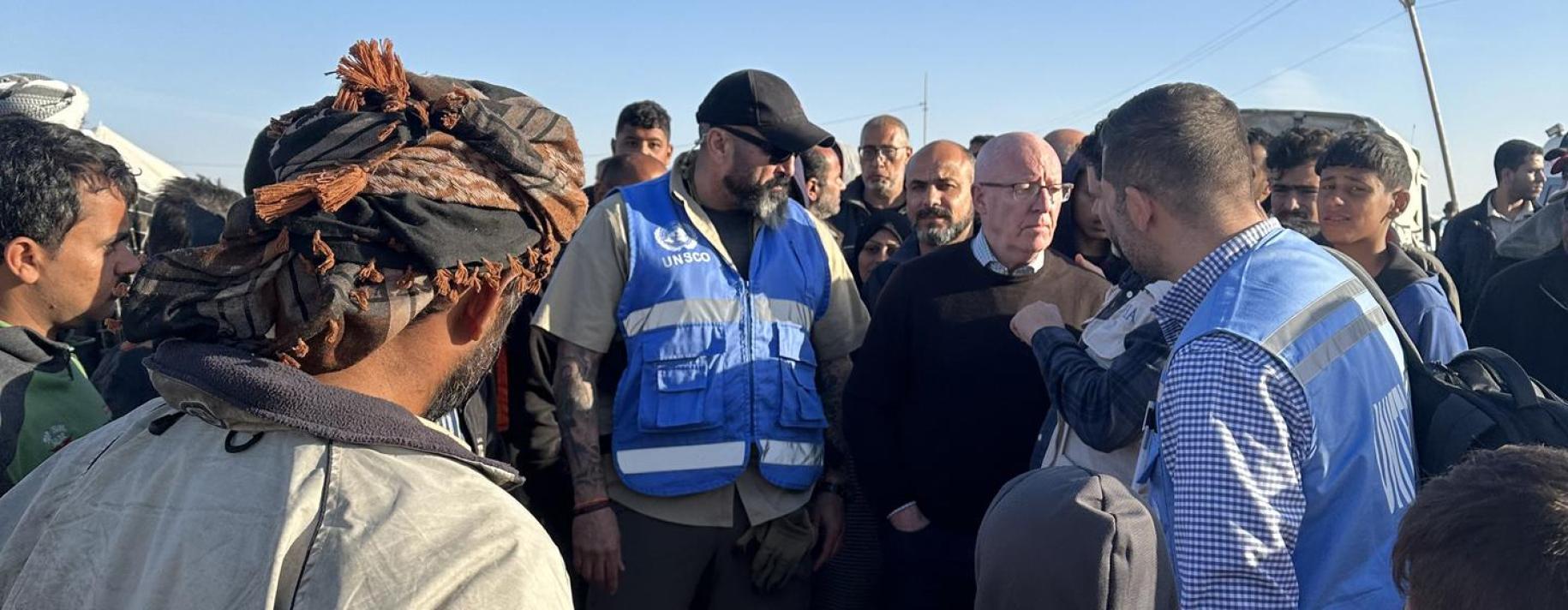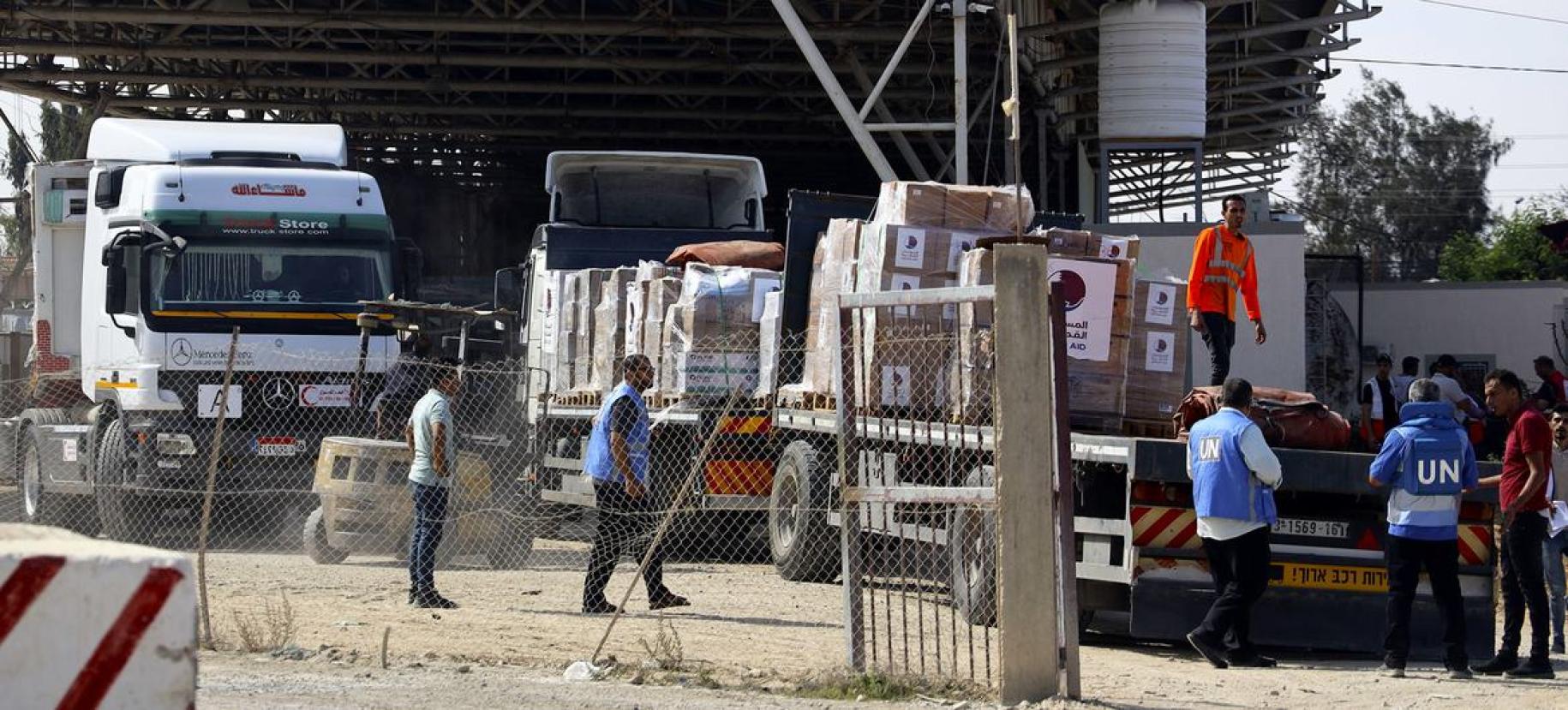As desperation gets deeper, UN Resident Coordinator calls for more access to aid for 2.2 million Gazans

As the war in Gaza between Israel and Palestinian militants reaches the 100 day mark, the UN is working flat out to meet the dire needs of hundreds of thousands of displaced civilians “through one door” at the Rafah crossing, a restriction imposed by Israel that has to change, said the newly-appointed UN Resident Coordinator Jamie McGoldrick in an interview with UN News.
At least 200 truckloads each day are needed and despite the “outstanding” efforts of national and international partners, UN humanitarians are stuck having to bring all supplies through a single choke point on Gaza’s southern frontier with Egypt, built as a pedestrian crossing, he said.
The veteran UN aid official spoke exclusively to UN News on Saturday, in his first interview since becoming the interim Resident Coordinator in the Palestinian Occupied Territory late last month.
Here are some insights from Mr. McGoldrick's interview upon recently returning from Gaza. He spoke with Ezzat El-Ferri from Jerusalem, where the UN Special Coordinator’s office (UNSCO) is headquartered, with other offices in the West Bank city of Ramallah and the Gaza Strip.

Suffering in Numbers
"The thing that strikes you most is the numbers. As soon as you arrive through Rafah, what hits you straight away is the immensity of the people who are displaced: every street, every pavement. They also have these makeshift tents built onto the side of buildings encroaching on the roads. It’s very hard to move around. The place is really, really packed.
The second thing I think is the fact that this crowded nature causes the lack of services that people have. Because this has happened so quickly, that number of people coming to the south (of Gaza). They reckon 1.7 or 1.8 million people in Rafah, which used to have a population of around 250,000. People have taken up space in hospitals, taken up space in UNRWA schools…and you go to these places, and you see the conditions people live in, the squalor, the crowded nature, the makeshift nature of it.
No one had the time to plan anything. People ran from where they came from: the middle area, the north area, and they came with very little. And the fact that it's the winter there as well. So, all of that makes it very, very difficult.
It has overwhelmed us because we have a very limited role there for this type of work, and we've had to try and scale up, trying to address the needs. But more importantly we would need to do more to scale up, to get more people, get more access, bring in more material. But it is a mammoth task."
The Human Dimension
Listening to UN colleagues' experiences over the past 100 days, Mr. McGoldrick said:
"There's a degree of shock and a degree of despair. And I think there's a sort of hopelessness there as well, because they don't see any answers to what it is that they face ahead. It's amazing also that there is resilience and the steadfastness of some of these colleagues who have been in that situation, who have come to the south fleeing as a displaced person, but still standing up to do work.
It's quite incredible that the people in Gaza have that spirit…and they still keep going on. The fact that there's been 146 UN colleagues killed. Others have lost parts of the families, yet they still deliver."
Growing Concerns
Alongside the immediate needs of better shelter, more supplies, cleaner water, sanitation and sewage facilities, gender-based violence and child protection issues are fast emerging concerns with a lot of unaccompanied children.
"Yesterday, we had 200 trucks, the most we've ever had to crossing into Rafah. There's nothing coming in from the north. It's all coming in from the south. We're trying to save the population, but we know there's probably all of the population of 2.2 million need some assistance of some kind.
And we are right now facing an uphill struggle to just address the needs of those who we reach. We need to reach far farther, far deeper and far for other places like the north. But there's ongoing conflict and military operations prevent us from either moving in some of the central zones. So, we're kind of stuck where we are, and it's very hard to move convoys, the convoys going north to serve those 250,000 - 300,000 estimated population there.
What we would like to do eventually is that, if the commercial sector starts up again, we can actually start supplying the shops that are closed because there's nothing in them. All the stocks have gone. We have to replenish those stocks.
And once we have that up to a certain scale, we can then start to use cash cards, cash voucher systems. But we’re a long way off that right now."

Limited Entry, Limited Resources
"We are trying to increase our operations. Our operations have been sort of hampered by the insistence of the government of Israel to use a pedestrian crossing in Rafah to bring truckloads of supplies. And while it's working well, we can't rely on all of Gaza - 2.2 million people - on one crossing point. We have to open up elsewhere.
The humanitarian operations are kept on a very light availability of fuel. This is a lifeline for the operations of the hospitals to keep the oxygenation, to keep the various parts of the actual hospitals working, the desalination plants to keep drinking water going there."
Eventual Return to the Peace Process
Acknowledging that deep into this conflict, the potential of peace and healing would rest on how Palestinians and Israelis alike gathered around the negotiating table, the Resident Coordinator doubled down on the significance of the peace processes:
"I think peace is more normal than war. I think that's the fundamental and I think that all people want to live in peace and have a life. They want to have a future. They want their dreams, they want to be able to know what's coming next. They want to be able to socialize and have families, and you can't have that in the situation where you've got this conflict and you've got this insecurity, and I think that has to disappear.
And then you can start the mending process, the healing process. You have to then think for yourself, how do you link to your neighbour? How do you link to the people that you are going to have to live side by side with? And it's an understanding and appreciation, an accommodation.
And we see it in many, many conflicts around the world. And unfortunately, this one is one of the most longstanding and the most deep rooted."
Listen and read the full interview here. To learn more about the UN's work in the Occupied Palestinian Territory, visit palestine.un.org.













